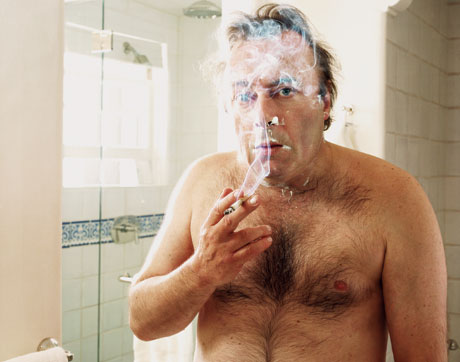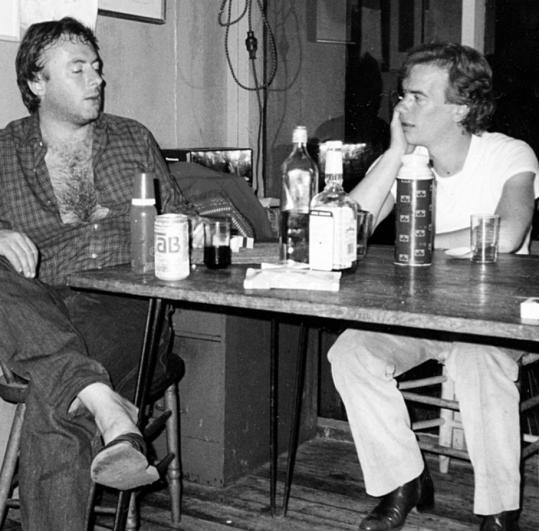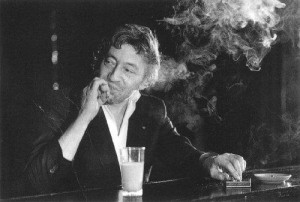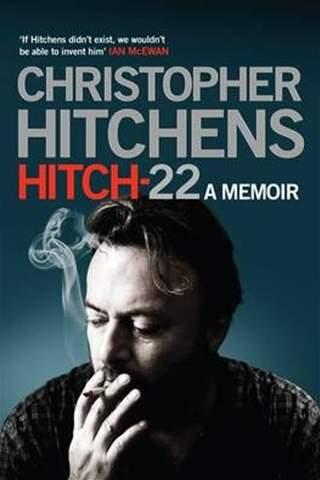Bored to Death. originally posted August 15, 2010
There are plenty of reasons to dislike this guy. He is obnoxious. He hates Mother Theresa (“friend of poverty, enemy of the poor, fundamentalist fanatic”) and Bill Clinton (“wasted eight years of America’s time”).He denounces Zionism as “a form of Bourgeoisie Nationalism”. Following the 11 September attacks, he battled Noam Chomsky over the proper response to radical Islamism for an entire year. He believes – with the fervor of a recent convert to American messianism – that the Iraq war was justified by a higher moral purpose and sanctified by the (so far) incalculable benefits that will eventually be seen to have resulted from the war. He did that stupid waterboarding stunt. He denies being a “conservative” but admits to being a “neo con” and with the imperviousness of a neo-con doesn’t “give a fig about world opinion” and has yet to admit that he might have been wrong about any of it (except of course in the “execution” of policy—as if there were no connection between absurd aims and failed execution). He voted for Ralph Nader. And in one unforgivable exertion of blind egoism and drunk/dry-drunk alcoholic brotherhood, he maintains to this day that he does not wish that Al Gore had beaten George W. Bush in 2000 or that John Kerry had won in 2004.
The reason Christopher Hitchens pisses me off is something else entirely. Because I like him. The fact that he’s wrong about Bush and Iraq and HCR is less important to me than the fact that beneath the fastuous, political windbag lies an ironic and eclectic louche, a withering snark with a ferocious wit. Someone you’d like to have a drink with if you still drank. As hard as he tries to be a quarrelsome, contentious cogent man of reason, a mordant critic and pitiless adversary, he is an extravagantly colorful observer, a great political pugilist and contrarian but also a dandy. He’s hilariously relentless in his critique of Christianity as a wicked cultand has penned the blasphemous atheist manifesto God is Not Great: How Religion Poisons Everything and better yet, The Missionary Position: Mother Teresa in Theory and Practice. He tears down the facade of sainthood erected by the hagiographers and rebuts the critics point by point, but does so effortlessly and rationally and never comes across as mean-spirited or humorless. He worships his friendships and is artless about his obvious romantic infatuation with the delicious Martin Amis (who can blame him?) and only recently declared that “I find now that I can more or less acquit myself on any charge of having desired Martin carnally. (My looks by then had in any case declined to the point where only women would go to bed with me.)”
He has the reputation of one who takes remorseless aim at what he deems the “fatted pigs” of political and moral hypocrisy, and places great value on cultivating and maintaining intellectual integrity, “[I]t is always how people think that counts for much more than what they think”. He’s said he’s tried to keep dueling notions in intellectual and emotional equipoise and chose journalism because it “was the ideal profession for someone like myself who was drawn to the Janus-faced mode of life, in that one has to seduce both sides to hear the whole story. He is a vicious rhetorical combatant but has a nice face, even when he is belligerently arguing a point and others have long ago given up the ghost. He believes in questioning everything, is a true sceptic and contrarian unfettered by allegiance to political party, ideology or politesse. He will courageously take any position with vigor, no matter how unlikely or how unpopular. His skill in marshalling facts in service to an argument is a wonder to behold. He is psychotically informed, having seemingly been everywhere, met everyone, and read everything. His command of language is legendary and he is a treasure trove of mot justes. He called Ronald Reagan a “cruel and stupid lizard.”He took on provincial English hairdressers who refused to cut black people’s hair.
What I don’t like about Hitch is that in virtually every photo of him – for the past 30 years – he has a cigarette in his face, and in every taped interview we are subjected to the irritating clink and clank of ice against the glass of his customary highball. Because Hitchens is known as much for his his love of cigarettes and alcohol as he is for his rapier wit and prodigious literary output. For some reason, he has chosen to embrace 2 addictions as an affectation and become that type: The smoking braggart drunk.
Three years ago, Vanity Fair ran a feature examining the exploding micro-economy dedicated to the proposition that the makeover (the time worn ugly-ducking-to-swan mythology), is feasible, and set out to disprove F Scott Fitzgerald’s dictum that there are no second acts in American lives. They sent the guyishly handsome 59 year old author – stressed and pale and puffy – as their guinea pig of betterment to the Four Seasons Spa in Santa Barbara, where he was subjected to the “Executive De-Stress Treatment”. In every photo of his various 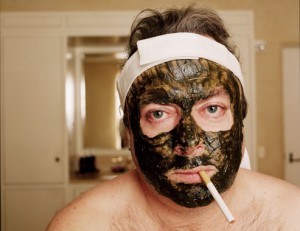 stages of physical betterment – detoxifying wraps in foil and linen, the reconstruction of his chompers and the painful waxing of his tummy and scrotum – he is smoking. Irony aside, is there anything more woeful than the modern adult pandering to his inner 1950’s teenager? It’s not that Hitch was unaware of the physical hideousness of the habit, the toll it had taken on his teeth and skin, the shame of – despite your identity being formulated on the idea that you are an smarter than everyone else – being successfully hoodwinked by Big Tobacco, and the suspension of ones judgment in the face of obvious self-destruction. He knew, but couldn’t shed the farcical costume of the smoking braggart drunk.
stages of physical betterment – detoxifying wraps in foil and linen, the reconstruction of his chompers and the painful waxing of his tummy and scrotum – he is smoking. Irony aside, is there anything more woeful than the modern adult pandering to his inner 1950’s teenager? It’s not that Hitch was unaware of the physical hideousness of the habit, the toll it had taken on his teeth and skin, the shame of – despite your identity being formulated on the idea that you are an smarter than everyone else – being successfully hoodwinked by Big Tobacco, and the suspension of ones judgment in the face of obvious self-destruction. He knew, but couldn’t shed the farcical costume of the smoking braggart drunk.
Don’t get me wrong, it’s not the debauched stories themselves I dislike. On the contrary, addiction memoirs are my third or fourth favorite reading genre. I snort addiction memoirs for breakfast. Addictions are forgivable, conquering them is laudable, writing about them courageous. It’s when the author extols the horrors of drugs, booze or nicotine in a way that seems like boasting that I cringe. The idea that these war storied men have gone places and seen things we wouldn’t dare to; pretending it’s a warning, rather than an Advertisement for Me. These guys are hard wired for extremes! Follow their debauchery but don’t try to keep up with them! On the one hand, the writers bemoan the horrors of their addictions and the effects they have on their lives. On the other, they take unfiltered, wild pleasure in their own willingness to transgress, and we are cool enough to be taken along for the ride, complicit, sober, but on the inside. Hitchins, who taught us that cheap booze is false economy”, has boasted that his daily intake of alcohol was enough “to kill or stun the average mule”, noting that many great writers “did some of their finest work when blotto, smashed, polluted, shitfaced, squiffy, whiffled, and three sheets to the wind”. Hitchens felt that after going rogue about the Iraq war, he was attacked with pointedly personalized venom over his fabled alcohol consumption, yet he welcomes being attacked as a lush ‘because I always think it’s a sign of victory when they move on to the ad hominem.’ (point taken).
He drinks, he says and repeats over and over again, “because it makes other people less boring. I have a great terror of being bored.” Wait. The people you hang out with are so boring that you must be high to suffer them? The people I hang out with are boring. But you? Martin Amis is boring? Ian McEwan, Julian Barnes, Clive James, James Fenton, Gore Vidal are boring?
In his 2010, ill-titled memoir, “Hitch-22” he describes his work/drink schedule;
“There was a time when I could reckon to outperform all but the most hardened imbibers, but I now drink relatively carefully. At about half past midday, a decent slug of Mr. Walker’s amber restorative, cut with Perrier water (an ideal delivery system) and no ice. At luncheon, perhaps half a bottle of red wine: not always more but never less. Then back to the desk, and ready to repeat the treatment at the evening meal. No ‘after dinner drinks, most especially nothing sweet and never, ever any brandy. ‘Nightcaps’ depend on how well the day went, but always the mixture as before. No mixing: no messing around with a gin here and a vodka there.”
The smoking braggart drunk cannot simply make a claim of diminished consumption without reminding us that at an earlier time he could drink us all under the table. Re:“decent slug of Mr. Waker’s Amber Restorative” – I googled this and it does not exist in reality. Mr. Walker’s Amber Atonic, maybe. Another old ploy of the smoking braggart drunk is invoking addicts of the past, and likening yourself to these better, more important guys:
In my case, most of my bad habits are connected with the only way I know to make a living. In order to keep reading and writing, I need the junky energy that scotch can provide, and the intense short-term concentration that nicotine can help supply. To be crouched over a book or a keyboard, with these conditions of mingled reverie and alertness, is my highest happiness. (Upon having visited the doctor, Jean-Paul Sartre was offered the following alternative: Give up cigarettes and carry on into a quiet old age and a normal death, or keep smoking and have his toes cut off. Then his feet. Then his legs. Assessing his prospects, Sartre told Simone de Beauvoir he wanted to think it over.†He actually did retire his gaspers, but only briefly. Later that year, asked to name the most important thing in his life, he replied, Everything. Living. Smoking).
But Sartre was also shoveling meth into his face, and was, well, Sartre. Hitchens may indeed have increased productivity under the influence of the mythical Mr Walker’s, but writers usually smoke and drink to “unwind”, and because they want – in Rimbaud’s phrase – to “systematically derange” all their senses, to slip into what Baudelaire called our “artificial paradises,” and they can do this because they don’t really have jobs. Where I’m from, drinking to the point of insensibility is an activity reserved for tgif, for the very young, the very-trust-funded or the very seriously under achieving. It’s also generally not water cooler fodder, boasting of stupefied excess with the bragging rights associated with high tolerance and the uncanny ability to drive themselves home drunk, using words like “wasted”, “fucked up”, or “shitfaced”. Worse yet are the braggart’s pathetic put-downs aimed at those who “sip” rather than “guzzle” or order a gay whiskey sour rather than something more manly like a vomitous blend of canned juice and well vodka. Most of the key texts of drug and booze writing adopt that kind of stoned revery. Writers, like comedians or actors are chronically ill-at-ease, and cigarettes, drugs and alcohol are the medicines that ease the pain of scary social situations – an essential prelude to being entertaining to others, to seduction and to basic 2 syllable word conversations.
British author and pimp-stylin’ smoking braggart drunk Sebastian Horsley’s memoir, “Dandy in the Underworld,” chronicles his exploits in drug addiction and alcoholism, relentlessly pillaging his catastrophic childhood to excuse his infantile, well documented debauchery. Modeling himself on – who else? – Lord Byron and Oscar Wilde, he suggested (wrongly) in an interview 8 days before he died of a heroin overdose earlier this year, that, at 47, he was “two-thirds dead”. ” “I havent really had a life” I’ve just sat in a room and died. That’s what we all do.“
Subversive and gleefully perverse provocateur Serge Gainsbourg is one of the more infuriating smoking braggart drunks. His parodic, relentless sucking of Gitanes and Pastis-fueled drunken debauchery are his legacy. Gainsbourg’s true worth as a ground-breaking artist is overshadowed by his obnoxious self abasement, continuing through heart attack after heart attack. The genius of la chanson Francaise, the toad eyed, playboy lover of some of the most impossibly beauteous women in the world, had been absorbed by a dissolute, foul mouthed, death-fixated degenerate, teetering on the edge of clinical insanity, the village idiot, the crumbling deity. One particularly brilliant obituary gave as cause of death: “He drank too many cigarettes.”
In 2006, Hitchens took on city hall in opposition of anti-smoking laws, under the flimsy reasoning that the West Village is dull and boring and sucks because smoking has been lost from the equation (not everything else, like the gay bookstore (“Creative Vision”) that closed and was replaced by “Belly Dance”, a boutique specializing in “hip maternity clothes for stylish moms”). “..I have a cigarette and a drink. I’m more fun to be with; other people seem less boring. The life of bohemia, of the small cafe and the little bar that never quite closes, is essential to cultural production”. News flash: There is no clinical proof that nicotine makes other people more interesting. Second hand boredom. And although I agree the life of Bohemia is essential to cultural production, the cancer stick isn’t.
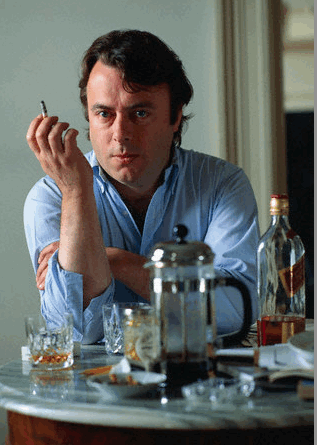 Christopher Hitchens actually did quit smoking in 2008, but picked it up again while writing his 2010 memoir and continued smoking until this past June when he was diagnosed with metastatic esophageal cancer that had spread to his lymph nodes and lungs. I cried.
Christopher Hitchens actually did quit smoking in 2008, but picked it up again while writing his 2010 memoir and continued smoking until this past June when he was diagnosed with metastatic esophageal cancer that had spread to his lymph nodes and lungs. I cried.
About his diagnosis he wrote: “Nothing prepared me for the early morning last June when I came to consciousness feeling as if I were actually shackled to my own corpse.” He went on to describe summoning EMS workers who took him “from country of the well across the stark frontier that marks off the land of malady.” So much for the spa makeover. The world can’t really afford to lose another productive, interesting person, but I guess he wasn’t thinking about the rest of us about when he knowingly (his father died of the same fucking disease), invited this cancer into his body. I really don’t like to think about not having Hitch to kick around, or kick us around, any more. I don’t like it at all.
When he announced this week that he is, in fact, dying, ever the atheist and knowing there is no one but himself to blame, he wrote, “To the dumb question ‘Why me?…the cosmos barely bothers to return the reply: Why not?”
I ask: Why not Sarah Palin? Why not Glenn Beck? Why not Kate Gosselin? Why not David Miscavige? Because God or no God, something took better care in creating Christopher Hitchens than those others. A man touched by greatness, following his own broken compass all over the map, carrying the torch of the dialectical thinker in contemporary society, using his polemical punch and intellectual elegance in every sentence. Epigrammatic, servile to none, always timeless and timely. A man of consequence. So I do ask Why. Why not Karl Rove? Why not Mel Gibson? Why is it that the idiots and jackals of this world, those who seem to have been biological or evolutionary after thoughts or mistakes, always succeed in taking care of themselves better than anyone else?

